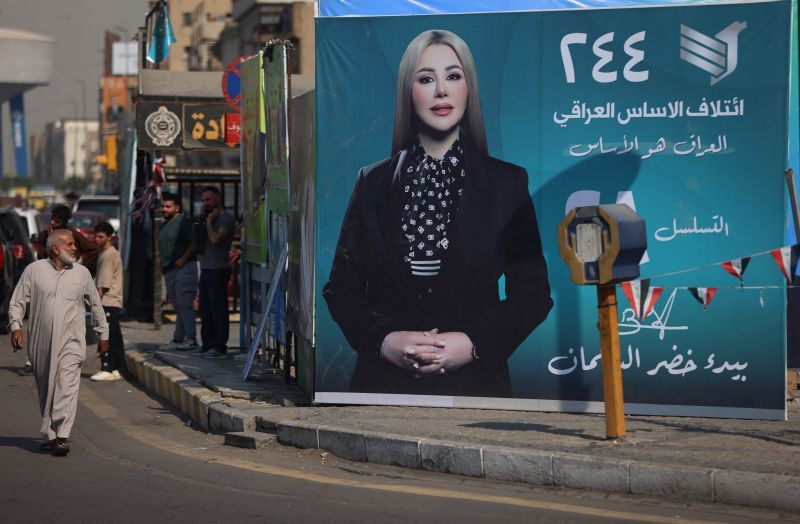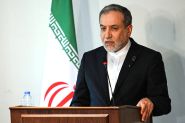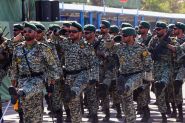- Home
- Middle East
- Iraq Heads to the Polls Amid Tension, Fear, and Hope

Iraqis walk past election posters in central Baghdad on October 19, 2025, ahead of the parliamentary elections scheduled for November 11. ©Ahmad Al-Rubaye / AFP
Baghdad is preparing to vote. On November 11, nearly 21.5 million registered Iraqis will elect the 329 members of the Council of Representatives. This is a decisive vote in a country caught between political gridlock and hopes for change. Iraq is searching for a new balance, away from sectarian tensions, corruption, and foreign influence. But the tone has already been set.
The election campaign began amid high tension. On October 15, Safaa al-Mashhadani, a Sunni candidate for the Baghdad Provincial Council, was killed when a bomb placed under his car exploded in Tarmiyah, north of the capital. Three of his bodyguards were seriously injured. The assassination, the first since the campaign began, shocked the public and reignited fears of political violence ahead of the vote. Parliament has launched an investigation, and Prime Minister Mohammed Shia al-Sudani has ordered the arrest of the suspects.
A Well-Organized but Contested Electoral Process
The elections will be overseen by the Independent High Electoral Commission, or IHEC. A total of 31 alliances, 38 parties, and 75 independent lists are competing. Each governorate forms a single constituency. Seats are allocated using the Sainte-Laguë method (1.7), a proportional system that divides the total votes by a constant factor to distribute seats according to each party’s share.
Electoral Law No. 12 of 2018, amended in 2023, guarantees at least 25% of seats for women, ensuring a minimum of 83 female MPs, and reserves seats for several minorities, including Christians, Yazidis, Sabeans, Fayli Kurds, and Turkmen. These quotas are designed to preserve Iraq’s sectarian diversity, even though in practice the main Shia, Sunni, and Kurdish blocs remain dominant.
A Test for Mohammed Shia al-Sudani
In office since October 27, 2022, Prime Minister Mohammed Shia al-Sudani is seeking a second term. He is backed by pro-Iranian Shia parties and aims to present himself as a guarantor of stability. Yet the balance remains fragile: Iraq must navigate militias, the rivalry between Washington and Tehran, and a society exhausted by shortages and corruption. Soudani is trying to show that he can manage the situation while maintaining state neutrality in a region that is unstable and constantly under pressure.
Muqtada al-Sadr: Absent but Ever-Present
The Shia leader Muqtada al-Sadr, a national figure with a broad popular base, confirmed on March 27, 2025, in a letter published by the Iraqi site Al-Alam al-Jadid and cited by Courrier International, that he will boycott the elections. “As long as corruption persists, I will not participate in any flawed electoral process,” he wrote, accusing political parties of serving foreign powers. In the 2021 parliamentary elections, his movement won 73 seats before withdrawing from Parliament amid a deadlock. His absence is expected to weaken the legitimacy of the upcoming vote.
Ballots and Weapons
A 24-hour electoral silence will take effect before the vote. Preliminary results are expected the day after the election, followed by manual and electronic verification. The final results will then be certified by the Federal Supreme Court after reviewing any appeals. The current Parliament will continue to sit until the new MPs are sworn in, scheduled for early January 2026.
Iraq hopes to show, before, during, and after the elections, that it can hold a vote without violence. Yet the assassination of Safaa al-Mashhadani highlights the fragility of a system still plagued by armed groups. As November 11 approaches, Iraqis are caught between the hope for a democratic renewal and the fear of slipping back into chaos.
Read more



Comments